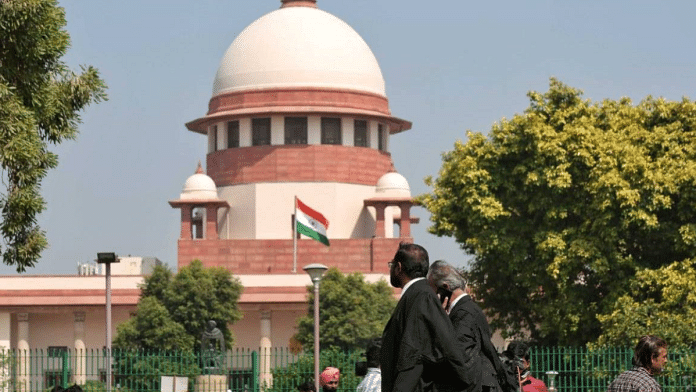New Delhi: A report by the Supreme Court’s Centre for Research and Planning has advocated discontinuing the use of words like jamadar to describe posts in subordinate courts, as they reflect a “colonial mindset”.
The report titled ‘State of the Judiciary: A report on Infrastructure, Budgeting, Human Resources and ICT’, which was uploaded on the SC’s website on 15 December, noted that jamadar as a name for the post of peon/orderly finds mention in staff rules of states including Jammu and Kashmir, Odisha and West Bengal.
“Shedding imperial nomenclatures from the designations is fundamental to ensuring dignity and giving an inclusive and holistic identity to the staff in district courts, who are an integral part of the justice delivery mechanism,” said the report.
It cited a Supreme Court judgment passed in May that also recognised the indispensable role of the district judiciary and discontinued the use of the phrase “subordinate judiciary”.
“No longer should this court refer to the district judiciary as ‘subordinate judiciary’. Not only is this a misnomer because the district judge is not per se subordinate to any other person in the exercise of her jurisdiction but also is disrespectful to the constitutional position of a district judge,” the SC had said.
“Our Constitution recognises and protects a district judge as a vital cog in the judicial system. Respect ought to be accorded to this institution and its contribution to the country,” the court added.
In keeping with this observation, the report said that the existing nomenclature of staff in district courts — like subordinate court staff, subordinate court establishment and judicial ministerial subordinate service — should give way to a more respectful nomenclature.
It asserted that the court staff of the district judiciary may be termed “district court staff” or “district court service.”
The report pointed out that, to redesignate posts that reflect colonial mindsets, the Supreme Court in April had amended the Supreme Court Officers and Servants (Conditions of Service and Conduct) Rules, 1961 by a notification for the change in nomenclature/designation of the posts of jamadar (farash) and jamadar (safaiwala) to supervisor.
Also Read: 31% of judges’ posts vacant in high courts, 21% in district judiciary, finds SC report
Shetty committee report
The SC report took note of a 2003 report of the first National Judicial Pay Commission on the improvement of service conditions of non-judicial staff in subordinate courts, set up under the chairmanship of former Supreme Court judge Justice K. Jagannatha Shetty.
Among other things, the 2003 report said that classifying staff into Classes I, II, III and IV brings out “class consciousness” within the service.
The report had therefore, said that court staff must form a homogeneous unit in whatever cadre they serve, and for a healthy and dignified atmosphere, it may be beneficial to redesignate the existing cadres of Class I, II, III and IV into Groups A, B, C and D.
However, the report noted that the class classification continues in some states, such as Gujarat.
(Edited by Richa Mishra)
Also Read: New criminal law bill passed in Lok Sabha redefines sedition & ‘terrorist act’, omits bestiality



